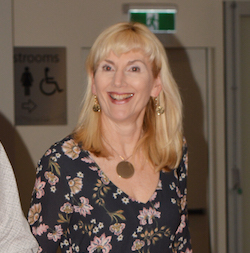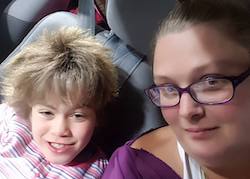MY CHILD HAS MPS
The time following an MPS diagnosis for your child can be heartbreaking and bewildering. Many parents say they feel numb and unable to believe what’s happening. Alongside feelings of grief and uncertainty are the genetic implications for siblings and other family members, financial considerations, practicalities such as child care and employment, as well whole new world of hospital visits, treatments and procedures.
At the time of diagnosis, a genetic counsellor can talk to you about the diagnosis and what this may mean for other family members. They can also tell you about treatment options for your child, support you through the decision-making process and talk about your options for ongoing care.
You may also be assigned a social worker who can discuss your emotional and practical concerns. They can offer referrals for psychological and psychiatric support as well as grief counselling. They will talk you through issues such as schooling, adolescence respite and employment; can advocate for you and offer referrals to hospital and community services.
More information
You can get additional support and information through organisations such as:
-
Physical therapy for children with MPS and Related Diseases, information for professionals – Physical therapy for professionals
Daily Living
As your child’s MPS progresses you may need to make changes to the way you do things at home to make life easier for everyone. There are all kinds of assistive equipment that can help with things such as bathing, lifting and moving around. An occupational therapist can come to your home, talk to you about any challenges you face and make recommendations about the kinds of equipment that will help you and your family throughout the day.
More information
-
Your doctor or school can refer you to an Occupational Therapist to discuss your daily living needs.
-
MPS families have a wealth of experience and knowledge about adaptive equipment, continence products, and resources. Join them on the MPS Facebook page www.facebook.com/MPSSocietyAustralia/
Education
Every child with MPS has different strengths and abilities. When the time comes, you will need to make decisions regarding your child’s education depending on their individual learning needs and you can seek advice from your paediatrician, social worker or kindergarten. There are a number of options to consider including special school, supported classes at a mainstream school or regular classes at a mainstream school – whichever will best suit your child.
Therapists and specialists provide valuable input into planning the learning and supports for students with disability and medical needs. They work in consultation with your child’s primary care Doctor.
For example:
-
an occupational therapist might suggest specialist seating, adaptive equipment such as pencil grips to optimise the student’s positioning for writing
-
a speech pathologist might recommend alternative communication systems
-
a physiotherapist might advise on everyday activities in class or in physical education sessions, to build gross or fine motor skills
-
a psychologist might advise on strategies to help a student build positive social relationships
More information
-
You can talk to your social worker, paediatrician or GP about educational options for your child.
-
Genetic Alliance Australia has a useful document entitled Students Living With a Genetic Condition: A Guide for Parents.
Emotional and social support
From the day your child is diagnosed with MPS your life changes completely. Every parent’s journey is unique but most say the support they receive from family and friends helps them get through. Emotional and social support may come from people already in your life, or you may find yourself needing to connect with others outside your current circle.
Being able to talk to others who have shared experience of MPS can be a great comfort and wherever possible we can help you find opportunities to do this by connecting you to other families in your area and through our biennial National Conference.
Joining a local support group for parents of children with additional needs can also be an option. While others in the group may not face the same challenges that you do, you will likely find common experiences and a level of understanding you do not get from others.
More information
-
You can talk to us about connecting with other families with lived experience of MPS
-
Visit Carers Australia for more information about support for parents and carers
-
Relationships Australia – call 1300 364 277 relationship support for individuals and families
Disability/Medical Supports
There are a range of disability supports available to families living with MPS and your child’s needs will likely change over time, depending on their age and level of disability. Supports available include personal care, respite services, equipment provision, therapy, in-school educational support, day programs and much more.
Government support for people with significant and permanent disability, their families and carers is now funded under the National Disability Insurance Scheme (NDIS). The NDIS is currently being rolled out across Australia and you can find out whether you can access the scheme by contacting the NDIS.
It’s important to know your options and make sure you are getting all the supports you need and are entitled to.
Parents/carers may also be eligible for income supplements if you provide additional daily care for someone with a disability or medical condition.
More information
-
You can talk to the MPS Society or your social worker about options available. If the NDIS is operating in your area, you can also talk to your planner about what you need now and in the future.
-
Visit: www.ndis.gov.au for more information about supports available under the NDIS
-
Through the Maze is an introductory guide to services and support in Victoria for your child and family – whether your child is waiting for or has received a diagnosis of disability or development delay
-
Children and young people with a disability CYDA
-
Carer Allowance
Advanced care
When your child has been diagnosed with a life limiting illness one of last things you want to think about is the type of care and medical treatment they will need in the last stages of their life. However, there comes a time when making a plan is in the best interest of both you and your child. An advance care plan takes into account the things that are important to your child and your family; your beliefs, values, goals and preferences in life.
During such an emotional and difficult time, an advance care plan helps doctors, nurses and other health professionals to know how you would like your child cared for. It can also help family and friends to support you and advocate for you if necessary.
More information
-
Your doctor will tell you when it is time to make an Advance Care Plan.
-
You can also visit:
Transition to Adult Services
Somewhere between the ages of 16-25 your child will transition from paediatric to adult services.
The changing nature of MPS and the varying ways in which it affects individuals means this process will be different for each person and family. However, the overall aim of a transition to adult services is that over time your child will become the one who interacts with their healthcare services, as opposed to you.
The level of cognitive capacity your child has will also influence the level to which they can become completely independent in dealing with adult services, however the process of transition should always ensure your child’s wishes, choices and preferences are the primary focus. The paediatric and adult services team should work together with you to make the transition as smooth as possible.
The transition to adult services is different in every state however there are some key elements that should be part of any successful transition. These include:
- personal involvement of your child in the process
- a period of preparation and education for your child about how the transition will work and what to expect
- a particular date that an official transfer from paediatric to adult services will take place, with both services being involved on that day
- an interested and capable adult services team
- involvement from patient organisations including advocacy where necessary
More information
You can talk to your paediatric team about preparing for your child’s transition and what to expect.


